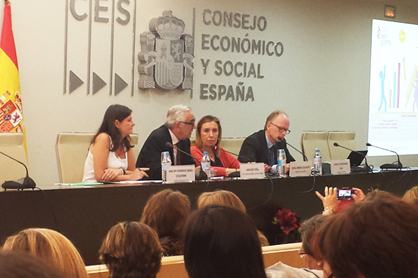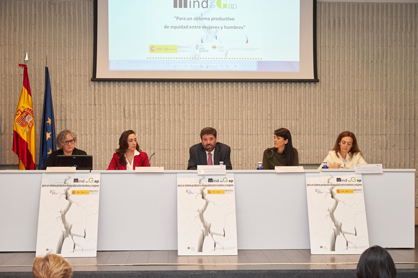Tackling gender pay gap
 European female workers earn 30% less than men. In order to fight against gender pay gap, the Spanish Gender Equality Programme has set 1.7 million euros aside for 9 projects, developed by Universities, trade unions and business organizations, with innovative results regarding both the nature of the subject and the solutions to it.
European female workers earn 30% less than men. In order to fight against gender pay gap, the Spanish Gender Equality Programme has set 1.7 million euros aside for 9 projects, developed by Universities, trade unions and business organizations, with innovative results regarding both the nature of the subject and the solutions to it.
19.10.2015
Fighting against gender pay gap is one of the main priorities of the Spanish Gender Equality Programme, operated by the Women’s Institute and for Equal Opportunities and co-financed by the EEA Grants. 9 projects have been developed in this field, funded by 1.7 million euros. The main goal: detecting the causes of the pay gap, that remains in spite of the advances, but also putting possible solutions on the table.
Most of the studies performed within these projects show that businessmen do not clearly intend to pay less to women, but factors such as less women on top positions, the difficulties of work-life balance, weaker job security and greater use of part-time work make gender pay gap a reality. Solutions require a coordinated action between the different social agents involved in this issue.
-Acctioon Equal Pay project, developed by trade union Comisiones Obreras, has launched some proposals for tackling the gender pay gap focused on two aspects: trade union action and public policies. Measures such as fostering female employability, or introducing gender mainstreaming in active employment policies, or a better regulation of part-time work… But also breaking with inertia in collective bargaining. “Wage discrimination makes that women and poverty goes hand in hand“, explained Ana Herranz, project promoter.
-Along these lines, the project “Tools for tackling the gender pay gap”, developed by trade union UGT, has launched two computer tools that will allow us to immediately know the percentage of existing wage differences, but also to identify the factors that have a greater influence in the establishment of different salaries. Additionally, a good practice and recommendations guide was published.
 -Project Mind the Gap, developed by University San Pablo CEU, provides an innovative approach to the issue. The multidisciplinary final study, with in-depths interviews to female from SMEs, big companies, public administrations and NGOs shows that many of the interviewees have had to choose between a career and motherhood at some stage, which stress the inadequacy of work-life balance measures. Even more worrying is the fact that the vast majority complains about the lack of shared responsibility of their partners. Besides, the study showcases an indirect discrimination in companies, where work is still assessed from the point of view of a male labour market.
-Project Mind the Gap, developed by University San Pablo CEU, provides an innovative approach to the issue. The multidisciplinary final study, with in-depths interviews to female from SMEs, big companies, public administrations and NGOs shows that many of the interviewees have had to choose between a career and motherhood at some stage, which stress the inadequacy of work-life balance measures. Even more worrying is the fact that the vast majority complains about the lack of shared responsibility of their partners. Besides, the study showcases an indirect discrimination in companies, where work is still assessed from the point of view of a male labour market.
-For their part, Confederation of Small and Medium Enterprises (Cepyme) have launched a best practices guide for fighting against wage gaps within Equals Project, also co-financed by the EEA Grants. The guide provides positive experiences in Spanish and Norwegian companies such as the establishment of a job classification system which guarantees equality, or the development of a job promotion system based on objective criteria, without forgetting training or work-life balance measures.
-Equotel project, focused on gender pay gap in the hotel sector, reveals that despite that the hotel sector employs more women than men, female workers conditions are much worse. An example: women account for 75% of the temporary contracts or part-time.
-Self-employment emerges as a solution against wages inequalities. A project developed by the Spanish Federation of Self-employed Workers stress “the possibility for a self-employed woman to generate greater income than working for others”. In addition, “women who choose self-employment are willing to organize their time and decide their future, they are well aware of the difficulties of achieving their goals so they are not going to discriminate between men and women neither in hiring nor in paying”, explained Elena Melgar, project promoter.
To sum up, different approaches to the same problem. In the words of Rosa Urbón, general director of the Spanish Women’s Institute and for Equal Opportunities, Gender Equality Programme Operator, “equality is a matter of social justice, cohesion and competitiveness”. This programme is funded with 10 million euros from the EEA Grants.